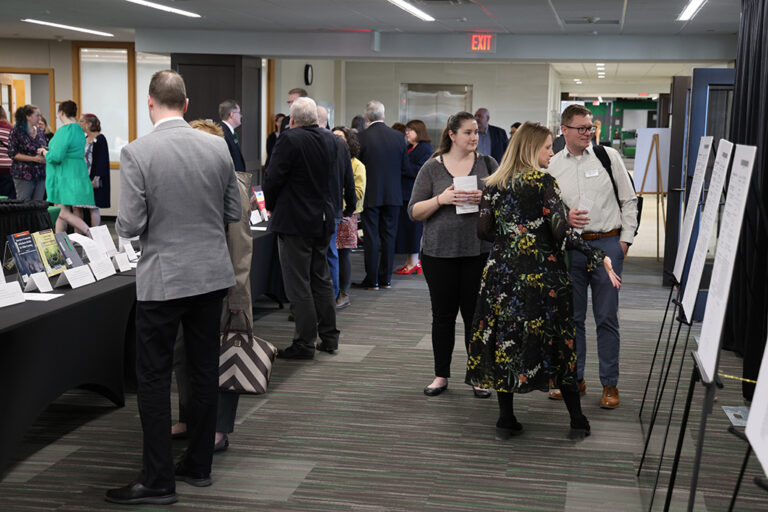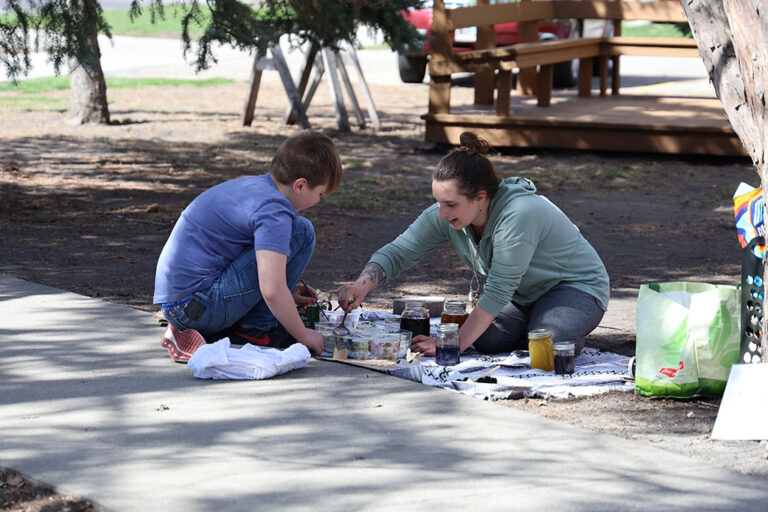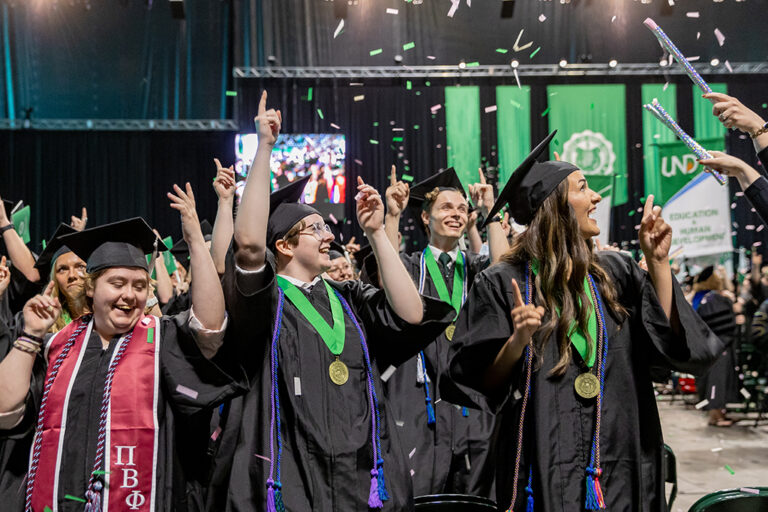Remembering David Gipp
The UND graduate, a giant of the Tribal College movement, led United Tribes Technical College in Bismarck for 37 years

People across the UND community have recognized the death of Standing Rock Sioux Tribe member David Gipp, aged 74, as the passing of one of the University’s most prominent American Indian alumni.
Gipp, former longtime president of United Tribes Technical College (UTTC) in Bismarck, died Friday after a long illness. He was a national leader in matters of tribal education, specifically within the Tribal College movement starting in the 1970s.
Before Gipp started his 37-year tenure as president at UTTC in 1977, he served as the first executive director of the American Indian Higher Education Consortium, an organization that was critical in the effort to establish colleges and universities governed by American Indian tribes.
And before that, Gipp founded the American Indian Student Association at UND prior to graduating with a political science degree in 1969. At the University, his work as a student laid the foundation for American Indian student involvement, activism and support at the state’s flagship institution.
Friends and colleagues chose words such as bright, intelligent and caring to describe the Fort Yates native.
“I do not know of anyone else who has done so much, nationally, especially in North Dakota, for the progression of American Indian people,” said Leigh Jeanotte, former director of UND’s American Indian Student Services. Jeanotte further characterized Gipp as a progressive and a motivator – “a mover and a shaker” – for American Indian education on the national stage.
Tireless advocate, educator
Chester Fritz Distinguished Professor of Biology Bill Sheridan referred to Gipp as a “giant” in matters of advocacy for the American Indian community.
“As president of the UTTC, he had a lot of influence, and set a good example,” Sheridan said. “I knew his reputation well in being stalwart – a man of great courage.”
That courage was never in short supply as Gipp pursued paths to education for tribal members nationwide. And throughout his career, including his time at UND, Gipp pushed for the full acceptance and fair treatment of Native people.
While a student, Gipp advocated for the removal of the “Sammy Sioux” caricature, which had been used as one of the University’s logos. Much later in his career, as an alumnus, Gipp became an important advocate for the retirement of the “Fighting Sioux” nickname and logo.
Sharon Carson, like Sheridan a Chester Fritz Distinguished Professor, said it was an honor to work with Gipp to support students and racial equity at UND.
“David Gipp worked tirelessly for decades not only to build up UTTC, but also to advance the Tribal College movement in the Dakotas and nationwide for generations of students,” Carson said. “He was great to work with, a good-hearted person generous with his time on behalf of others.
“His passing is a real loss.”
Jeanotte, looking back on the nickname controversy that spanned a number of years, said Gipp was always constructive in addressing the issue.
“He was always trying to educate people in terms of what the issue was, and the hardship that many times it caused,” Jeanotte told UND Today. “He was a great person and truly will be missed.”

Paving paths to education
Leander McDonald, current president of the United Tribes Technical College in Bismarck, further established the case for Gipp as a pioneer for tribal education.
McDonald is a UND graduate as well as a former research analyst and assistant professor in the School of Medicine & Health Sciences. He holds a Ph.D. in Educational Foundations & Research from the College of Education & Human Development.
In an interview with UND Today, McDonald said that he, as well as hundreds of American Indian students, have enjoyed the fruits of Gipp’s labor, and the efforts of people like him.
“For Dave, it was a different time,” said McDonald of Gipp’s UND education.

In the late 1960s, the Civil Rights Movement had continued momentum across the United States and Indian Country, McDonald explained. Even so, there were not many people from tribal populations going to college and completing their degrees.
“Those who went to school at the time were able to recognize the importance of higher education, and how that applies to us as tribal communities in addressing the needs of our people,” McDonald said. “So, Dave’s political science degree combined with the momentum of the Civil Rights Movement led him to also recognize the importance of legislation and advocacy.”
The legislative process was crucial in Gipp’s work through his leadership of the American Indian Higher Education Consortium, as well as throughout his UTTC presidency. Through persistent lobbying resulting in multiple acts of Congress, Gipp and his collaborators kept already-existing Tribal Colleges funded and laid a path to establishing dozens more throughout the United States.
Meanwhile, Gipp’s UTTC leadership ushered an era of academic accreditation, in spite of all of the funding challenges the College faced. As the Bismarck Tribune observed in Gipp’s obituary, “United Tribes was an unaccredited work force training tribal college on the brink of closure when Gipp arrived. He transformed it to an accredited liberal-arts institution that has served thousands of students from more than 75 federally recognized tribes across the nation.”
Honoring a life of service
And in addition to their founding the UND American Indian Student Association, Gipp and his contemporaries built the foundations for support systems that exist on UND’s campus today.
Gipp, for instance, sat on the board for UND’s Indians Into Medicine Program for a number of years. In nearly 50 years, INMED has produced almost 1,000 American Indian health professionals, including more than 250 physicians.
“By the time I was at UND in the late 1990s, those types of supports were in place to help us socialize, assist one another and motivate each other to continue our educations,” McDonald said.
And more than 30 years after Gipp spoke out against tribal identities being appropriated by others for sports, McDonald became one of the Native people sitting on UND’s name-change committee.
After his time at UND, McDonald went on to serve as Vice President of Academic Affairs at Cankdeska Cikana Community College and as Chairman of the Spirit Lake Nation.
In 2014, he assumed the UTTC presidency following Gipp’s retirement as one of the longest-serving college presidents in the country.

“Whenever Dave visited, he was always willing to help,” McDonald said. “He always came from a perspective of being of service to you. That’s the telltale mark of a great educator. We need to have that perspective, especially when it comes to delivering quality education to first-generation and low-income students.”
With a Lakota name – Wica Kpe Is Nala (Wee Cha Kpe Eesh Nala) – translating to “Lone Star,” David Gipp was one who shone especially bright. The Lone Star Arena in Bismarck, named in his honor, hosts some of the largest powwows in the world each year.
In 1991, Gipp received an honorary doctorate from North Dakota State University for his contributions to tribal education.
“David Gipp devoted his entire adult life to serving Native People, using his vision and activism to address injustice and improve the acceptance of Native People in the modern world,” read a statement from McDonald, on behalf of UTTC.
“As the United Tribes Technical College president and as a leader for the tribal college movement, he helped thousands of students pursue education and training to uplift their lives and those of their families and communities. … David Gipp will always be remembered and honored at United Tribes as one who was dedicated to the advancement and success of others.”



